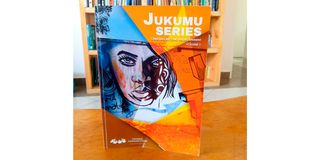When art meets activism: Book explores role of creative works in social change

The cover page of the newly-launched Jukumu Series.
If indeed, the soul of a nation is to be found in the temple of its literature and arts, as Uganda’s former President Milton Obote suggested in his 1969 speech delivered at the Makerere Arts Festival, then we must ask ourselves the role of art in addressing societal challenges.
Artivism, a blended word combining art and activism, was, perhaps, coined in an attempt to explain what it would look like if art and activism were married.
It is broadly defined as using art as a social transformation tool.
One of the Kenyan artists that epitomises this is Eric Wainaina. In his seminal song, Nchi Ya Kitu Kidogo (A country of bribes), he rebuked the corruption culture through hard-hitting and sometimes cheeky lyrics.
Nchi ya kitu kidogo/ Ni nchi ya watu wadogo/ Ukitaka soda ewe inspekta, burudika na Fanta/Nchi ya kitu kidogo/ Ni nchi ya watu wadogo/ Ukitaka chai ewe mama, nunua ketepa (A country of bribes/ Is a country of small people? / If you want a soda (slang for a bribe), inspector, be content with a Fanta/ If you want tea (slang for a bribe), dear mama, buy Ketepa (a brand of tea leaves).
More recently, in 2019, hip hop artiste King Kaka called Kenyans fools in his song, Wajinga Nyinyi, where he questioned the intelligence of Kenyans during elections, as they voted in people with questionable characters then complained when they did not deliver on their promises.
The fact that art plays an invaluable role in transforming societies can’t be overstated. This could be why Twaweza Communications, an art, culture and media organisation, tried to dig into the question of what it really looks like in a world where we invested in art and creating beyond entertainment in a project titled The Jukumu Series: Creating Beyond Entertainment. This was done in partnership with Forum CIV, a Swedish non governmental member organisation.
Twaweza Communications refer to it as part of a systematic search for understanding the roles that the arts, culture and media play in social change.
“Our aim was to document how the arts and media are used for behaviour change and policy advocacy in support of human rights, democracy, accountability and gender equality,” said the Twaweza director, Prof Kimani Njogu, at the launch of the Jukumu report in Nairobi in October 2021. The launch came at the tail end of a week-long forum dubbed Artivism Week that featured keynote speeches by Zein AbuBakar, Moraa Gitaa and Dr Wandia Njoya, moderated discussions with and performances by local artists from across the genres.
According to Prof Njogu, the project was inspired by, among other things, the fact that artistic freedom, human rights, democracy or gender equality are a constitutional mandate and that the civic space is constantly jeopardised. The organisation hopes that the findings in the report will help stakeholders in human rights, gender equality and democracy, development partners, national and county governments learn from best practices.
But what does artivism mean for artists?
Willie Oeba, a self-described Nakuru-based urban spoken word hip hop artist and expressionist, says: “Artivism means amplifying my voice for the sake of people who cannot do it for themselves. I started artivism after being nearly shot dead by a police officer in Nakuru on January 21, 2017. I resorted to defending human rights and dignity. Artivism means defending human dignity.”
The award-winning artist is the executive director of Voices Guild 254 (VOG 254), a community-based organisation in Nakuru that uses art to champion social change.
The organisation works with artists in Nakuru on artivism, youth empowerment and human rights and was part of the organisations interviewed for the Jukumu report.
The Bachelor of Science graduate in Media Science from Moi University (2019), a former radio presenter at Hero Radio and an entertainment show host at Nakuru TV hopes the Jukumu report will set the agenda towards having better artist policies in the country and that it can be used as a blueprint of how organisations can successfully partner with creatives.
According to the Jukumu report, arts provide leverage to address sensitive cultural issues, help build strong emotional connections and strengthen behaviour change.
Great things happen when art and activism are in a healthy relationship, and the report has brilliant examples of different projects where this partnership has borne fruit.
According to the report, some of these partnerships have resulted in improved knowledge on human rights and skills for defending these rights, change in realisation of gender equality, and deepening of democratic governance - like enhanced capacity among citizens to demand access to quality services.
Renown poet Okot p’Bitek, in his book Artist, the Ruler: Essays on Art, Culture, and Values best captured the value or art in activism when he wrote that artists respond intuitively to what is happening, what has happened and what will happen, and that the artist, who employs beautiful things, sweet songs and funny stories, is a greater ruler than the one who uses brute force to subdue men.
In the words of Prof Njogu, you can't solve a problem unless it is raised to the level of consciousness, and art does that for society. Artists are not claiming relevance anymore, they are relevant.
[email protected]; @FaithOneya





